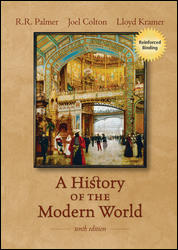 
History of the Modern World, 10th Edition (Palmer)Chapter 14:
European Civilization, 1871-1914: Economy and PoliticsLearning ObjectivesChapter 14 teaches students about:
The materialistic bases of European definitions of civilization. |
 |  |  |
The causes of demographic growth within Europe. |
 |  |  |
Changes in European society brought about by urban life, new family patterns, and extensive migration from Europe to other parts of the world. |
 |  |  |
How the industrial revolution entered a new phase, spread across the continent, and drew the rest of the world into an integrated world market. |
 |  |  |
The advantages and insecurities of the newly-founded world market, as well as the opposition that capitalism roused from socialists and labor. |
 |  |  |
The renewed efforts to establish the Third Republic in France, and the instabilities and tensions that troubled that republic. |
 |  |  |
The rise of British labor and Liberal responses to the founding of the Labour party. |
 |  |  |
The challenges presented to Bismarck's power by the Catholic church and socialism, and the chancellor's repression of both. |
 |  |  |
Changes within Italy, Germany, and Austria-Hungary, where constitutionalism and liberal ideals were sometimes advanced, but at other moments was stifled. |
 |  |  |
The overall advance in democracy, especially with the expansion of suffrage throughout Europe. |
 |  |
|





